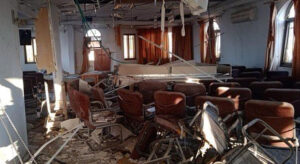
ATLANTA (BP)–“It grieves me to think that it takes people getting killed, buildings being burned and children being scarred for life to get people to take a serious look at the issues,” said David Henderman, director of OSI Network, a Christian security and investigation firm in the Atlanta area.
Over the past year many churches and Christian ministries have just begun to consider what they might do if what happened Sept. 15, 1999, at Wedgwood Baptist Church in Fort Worth, Texas, should happen at their facility.
“We live in difficult times. Even in my lifetime, the crimes that are committed have become out of control, and the frequency in which they occur is alarming,” said Henderman, formerly a member of the Atlanta police department who served as liaison between protection details and the Secret Service. He has provided executive protection and consultation for the Carter Presidential Library since 1990. He also is caring for the security issues of the current president of the Southern Baptist Convention.
As various secular and Christian news outlets have addressed the topic of church security over the past year, presentations have ranged from those stating church members should be calm since what happened at Wedgwood was an isolated incident, to those who interpret the event as a sign that the world is closer to the end times and that the Wedgwood tragedy, together with Columbine, Paducah and other school shootings, is just the beginning and things are going to get worse.
There’s got to be a healthy balance in there somewhere, Henderman said. “A lot of times knee-jerk reactions are based in fear. They also are based in a lack of education in the area of security.”
Concerning the fear factor, “I think church-wide this year there has been almost an undercurrent of fear. It is a very strong concern, but without direction. That sets the stage for serious problems,” Henderman said, for “fear is where the enemy can work.”
The “it’s never going to happen to us” attitude is “still a big problem, but I think the church is waking up from it,” he said. Sometimes another problem is created when people wake up from that attitude and go to an extreme. “They go from ‘It’s not going to happen to me’ to ‘It’s going to happen to me, and we’ve got to do something right now.'”
Strategic thinking is needed instead, Henderman said. “It is very, very important that we learn to think in broad strategy rather than focused tactics,” he said. “So what if people in the media don’t like us, so what if people are targeting us, so what if people hate us. That is the world we live in, so we can’t worry about these things. That’s not the real issue.”
The real issue is that churches and Christian ministries need to be prepared for unexpected events, in writing, “so they don’t end up sidetracking the entire ministry when problems occur.”
Preparation is the key to response, he said. “Remember that God called us to be gentle as doves, but wise as serpents. We must deal with this issue wisely.”
Henderman said he has found that the same people who wouldn’t consider any type of security measures for their church would, however, make sure they had the appropriate locks and lighting for their home to protect their family.
“We should protect [God’s] church and his people just as we would protect our own families,” he said.
After being asked to re-evaluate the list of security issues he presented to Baptist Press in September 1999, Henderman said:
1) “Education is still at the top of the list.”
Security and risk assessment/management training should be a part of the education of every minister or missionary, he said. In addition, the people often in charge of church security — deacons, Sunday school directors and ushers, “who too often have no background or formal training in security issues,” need to be adequately prepared to fulfill their responsibilities.
“God tells us in the Bible to learn, to seek wisdom, to seek knowledge. The Book of Proverbs really applies a lot in the security arena.” To learn more, “seek out qualified educational experiences, seminars, classes, consultants,” Henderman said, because “when we do not understand something, many times we fear it. The biggest thing that I’m hearing from churches and ministries is ‘We don’t know what to do.'”
2) Conduct a security survey.
Henderman had this fourth on last year’s list; he now moves it up because “I’m learning as I deal with more and more churches and ministries, especially over the past year, that so many do not have any kind of policies or procedures in place.”
Every church and ministry, both small and large, should have in place a security survey, completely outlining all known security issues, addressing possible solutions and detailing a plan for the future, Henderman counseled. “The survey is a tool that will be expected by the courts in the event of an incident where liability or negligence become an issue,” he said.
Instead of looking at it purely as a security issue, he added, churches should look at it as managing their risk and managing the assets of their ministry, “and that goes back to an issue of stewardship.”
Without a proper security survey in place, “They could lose a major ministry overnight,” Henderman said.
3) “Act. Do something about these things.”
“I’m seeing that a lot of ministries will identify the problem, and then they just walk away from it because they don’t know what to do,” Henderman said. “They absolutely must act, and if they don’t, the courts are going to hold them accountable for it.”
God can always turn evil to good, Henderman is glad to say. Through his own work he could give “countless stories about God’s grace and intervention in the midst of struggle.”
A devoted Christian and member of First Baptist Church, Snellville, Ga., Henderman has been working on a book over the past year, “Strategic Thinking: The Ministry, Risk Mitigation, and Operations Security,” dealing not only with the safety and security issues of churches and other Christian ministries, but also looking at the situation as a whole to get a proper perspective. He also provides seminars and on-site security surveys.
When he first began his business in 1990, his burden for the church was just as great as it is today. Protecting the church and the Lord’s people are just as important as protecting presidential dignitaries or heads of state, Henderman said. “But it was difficult. Our service was ridiculed and insulted.” A few ministers, upon hearing about OSI’s services, went to the extreme of saying, “There is no room in the church for any such thing as ‘Christian Commandos.'”
“They really missed the point,” Henderman said, noting this attitude still exists today. “I thank God that there are some pastors and laypersons who are beginning to see the need [for security procedures and risk mitigation] and are attempting to take action.
“We live in a world that is changing. As the world situations change, so must we,” he said. “I think that’s really important because if we try to run off the old models, we’ll compound the problems.”
Since the courts mandate people must be properly cared for if they are drawn together, “we must take care of them. Ministers have a responsibility for the safety of those people. But I have been literally appalled at what I’ve seen going on in some instances.”
Education, good sense and wisdom from the Lord regarding matters of security, he said, are “simply matters of accountability and stewardship.”
For more information, contact David Henderman at (770) 931-3101 or send an electronic inquiry to him at [email protected]. The OSI website address is www.osinetwork.com.
–30–













